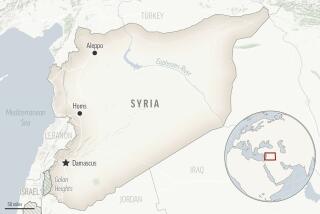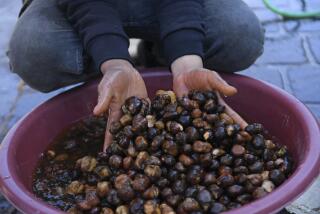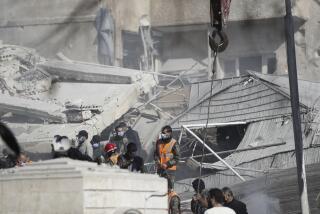In Damascus, city of dread, residents stay indoors
DAMASCUS, Syria — The young Syrian mother had just fed her baby girl and put her down for a nap. The woman’s husband was at work.
Suddenly, a projectile entered the home, lodging in the chair where the baby had been sitting a few moments earlier.
“I was standing in the kitchen, and I swear I saw it whiz by me,” said the mother, Sema, 26. “A bullet!”
Sema and her family promptly left their home in the strife-ridden Damascus suburb of Zamalka, the scene of numerous battles, and moved in with her in-laws near downtown, still relatively unscathed.
But the war is bearing down on this historic capital, a place once buzzing with lively cafes and carefree, late-night revelers.
Rebels opposed to President Bashar Assad’s government have been vowing for weeks that the final battle to control Damascus is imminent. The government has responded with more shelling and aerial bombardment of residential districts suspected of harboring rebels, particularly in the suburbs to the south and east. Checkpoints are everywhere. The sense of dread is ubiquitous.
On a recent weekend, authorities even cordoned off the capital, barring commuters from entering amid fear that the rebels were coming. Last week, insurgents managed to cut off the road to the international airport, disrupting flights.
Clashes reportedly continued along the major artery Thursday. It’s still unclear how Internet and telephone service was taken down for two days, though many suspect a government motive, to keep people in the dark about the deteriorating security.
A recent tea party with women and children at a private home afforded a glimpse of the profound uncertainty and anxiety overwhelming people like Sema. They are middle-class residents who previously led stable, predictable lives in what was until recently one of the region’s most secure capitals. The women did not want their names published for safety reasons.
As the women gathered, an explosion thundered not too far away, near the city center. Soon, the power went off.
“Oh, my God! Maybe it was a bomb here in the neighborhood,” said one of the guests.
Seemingly unperturbed, the hostess sprang into action. Using a cellphone as a flashlight, she went into another room and returned with candles. She soon reappeared with tea and cake, prepared for the occasion.
The guests chatted for about an hour in candlelight, discussing few topics other than the war, and how it had disrupted everyone’s lives.
One woman bemoaned how, for several weeks, nine family members — who once lived in three separate homes — now shared her three-bedroom apartment.
For several weeks, she had been hosting her brother, his wife and the couple’s daughter, who last year was a freshman English literature student at Aleppo University. The university is shuttered now, as Syria’s once-vibrant commercial hub has been transformed into an urban battleground.
“It’s been so difficult for all of us, because they feel homeless, and we don’t have much room,” the woman said.
Last month, her son and his wife and baby also abandoned their home in the suburb of Itseyya. They left after military helicopters appeared “out of nowhere” and began bombarding the area, she said.
“I swear, it wasn’t even 7 a.m. when they got into their car and rushed to our home,” the woman recalled. “His wife was still in her sleeping gown.”
Routines have been shattered, and long-familiar undertakings are now fraught with hazard.
One woman’s adult son was recently kidnapped by unknown assailants, part of a crime wave that has accompanied the breakdown in security. He was returned three weeks later, bruised and with broken bones, but alive, after his family paid a ransom.
The threat of a repeat abduction means he can no longer attend to the small family business, a textile factory situated near a suburb. It is too dangerous to go there.
“And we know the kidnappers have their eyes on my husband, too,” the woman added. “So he’s not going to work, either.”
Many once-active professional men and women — merchants and academics, doctors and lawyers, professors and bankers — have become virtual prisoners in their homes.
Many people now make it a point to be home shortly after dark. This has been a blow especially for the young and restless, like Ibrahim, 22.
Ibrahim always lived at home, but he used to have his own car, a full-time job at his father’s shop in Damascus’ Old City, and a thriving social life. After one of his close friends was kidnapped, however, his parents insisted on taking away the car, worried for their son’s safety.
“To make matter worse, most of his friends have left Syria,” his mother said. “Everyone’s leaving. So all he does now is come home by 8 and sit in front of the television, depressed, then sneaks out on the balcony to smoke cigarettes. That’s his life now.”
At this point, electricity came back on. A young mother whose two daughters sat next to her began to lament what she called the good old days.
“We moved to Syria four years ago from Saudi [Arabia] because we wanted our girls to grow up here,” she said. “And now look at the situation. Until when will this violence continue? This chaos.”
The hostess chimed in. “The rebels say they’re coming soon,” said the woman, whose husband is an opposition activist. “Unfortunately, with this stubborn regime, things are sure to get much worse before they get better.”
There was a sudden whimpering. A 7-year-old girl buried her face in her mother’s side, finding a personal sanctuary.
“I don’t want them to destroy our house,” the girl, teary-eyed, responded when her mother asked what was wrong. “I don’t want them to steal me from school.”
Elass is a special correspondent.
More to Read
Start your day right
Sign up for Essential California for news, features and recommendations from the L.A. Times and beyond in your inbox six days a week.
You may occasionally receive promotional content from the Los Angeles Times.






